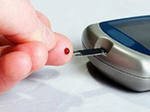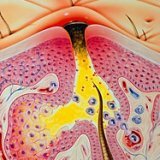Insulin-dependent diabetes mellitus in children
 Insulin-dependent diabetes mellitus( or iabet type 1) is a disease that usually affects mainly children and adolescents. It is not by chance that the name "juvenile diabetes" was used for this disease, that is, it refers to childhood and people who have not reached puberty. And the modern name of the disease - insulin-dependent diabetes mellitus - speaks about the lifelong need of such patients in insulin.
Insulin-dependent diabetes mellitus( or iabet type 1) is a disease that usually affects mainly children and adolescents. It is not by chance that the name "juvenile diabetes" was used for this disease, that is, it refers to childhood and people who have not reached puberty. And the modern name of the disease - insulin-dependent diabetes mellitus - speaks about the lifelong need of such patients in insulin.
Currently, in , diabetes mellitus among all possible endocrine diseases in children takes a leading place. This severe disease that occurs in children is usually acute and, in the absence of treatment, progresses rapidly. This is explained by the provoking effect of intensive growth of the child's body and increased metabolism.
Diabetes mellitus is developing in children as a whole by the same mechanism as in adults. However, there are certain individuals of for the development of the disease. In a child, the pancreas( an insulin producing organ) is very small. By the age of 10, its mass doubles, reaching a weight of about 50 g. The final formation of the pancreas ends by five years. And at this age, the risk of diabetes is particularly high.
Carbohydrate metabolism( like other metabolic processes) in the child's body proceeds much faster than in adults. So, for 1 kg of weight the child needs 10 grams of carbohydrates per day. This explains the love of children for sweets - the natural need of the child's body. By the way, contrary to popular belief, the consumption of a large amount of sweet in itself does not lead to the development of the disease in the child. The carbohydrate metabolism in the child's body is affected by the nervous system, which is also not yet formed and can promote blood sugar.
There may be several reasons for the development of diabetes in children. The main reason is a viral infection that affects the pancreas cells that produce insulin. There are many infectious diseases of childhood that can affect the development of diabetes. Among them - all known measles, mumps, rubella, etc. In this regard, it is necessary to note the importance of timely vaccination of the child as one of the measures to prevent the development of this disease in children.
Among the risk factors it is necessary to note also the following:
- Hereditary factor. Children born from parents with diabetes mellitus.
- Frequent viral diseases in children.
- Large body mass of the child at birth( more than 4, 5 kg).
- General decrease in immunity in a child.
- Metabolic disorders( obesity).
Parents can not always determine the presence of diabetes in a child on time. And yet certain symptoms should alert them. Basically, they are the same as in adults( increased thirst, severe course of infectious diseases, fatigue, inability to concentrate and excessive( more than 2-3 liters per day) urine).
One of the most important symptoms for determining the disease in a child is enuresis( bedwetting). In diabetics, this is due to the fact that urine is excreted in sick children 2-4 times more than in healthy children.
Parental anxiety should cause damage to the child's skin( redness, itching, furunculosis, etc.).
In infants, you can identify with diabetes mellitus, Active focus on digestive disorders, anxiety, increased thirst. Sugar, present in the baby's urine, makes his diapers harsh, crisp. However, these symptoms can be observed with the average and severe form of the disease. With a mild form, there can be no signs of the disease at all, and the diagnosis can be made only when determining the level of sugar in the blood and urine.
Diabetes mellitus in children - the disease is serious and requires the treatment of an integrated approach. It includes the mandatory availability of three components - drug treatment, diet and exercise.
Treatment with medicines.
Insulin-dependent diabetes mellitus in children presupposes, as a rule, compulsory treatment with insulin. Tablets, enough ffective in the treatment of adults, little help children. They are used usually in very mild forms of the disease or as an adjuvant for reducing the dose of insulin.
At present, due to the use of insulin preparations with long-lasting effect, it usually takes one injection per day. The choice of drug, dosage and schedule of injection is determined by the doctor.
The extent to which the treatment with insulin is correctly selected and organized, with constant control over the child's health, is mainly dependent on the course of the disease. This allows children, despite the presence of the disease, to lead a full life.
Diet
In the treatment of diabetes mellitus, the properly selected nutrition of the child plays a crucial role. First of all, it should be as balanced as possible for all the ingredients( proteins, fats, carbohydrates, vitamins).However, this requirement must be followed and when forming a diet in healthy children. In addition, it is necessary to exclude the carbon load on the child's body.
The use of bakery products from wheat flour, potatoes, semolina and rice porridge is limited. From cereals it is preferable to grind cereals( oatmeal, buckwheat, corn).
Vegetables( with the exception of potatoes), children can eat without restrictions, moreover, dishes from vegetables should make up a significant part of their diet. In the diet of a child with diabetes, fruits and berries are widely included( unsweetened varieties ).Occasionally - citrus fruits, strawberries, raspberries, strawberries. They can be consumed both raw and in compotes with sugar substitutes.
It is necessary to exclude fat, sharp and salty dishes from the child's menu.
A child suffering from diabetes should be fed more often than healthy - 6 times a day, while taking into account those dishes( from among the ones useful to the child) that he likes more.
Physical Exercises.
Physical loads for the baby are necessary. They increase the sensitivity of tissues to insulin and thus contribute to lowering blood sugar levels. However, only metered loads are useful, with constant monitoring of the child's condition.
During exercise, it is mandatory to use additional carbohydrates in combination with periodic monitoring of blood sugar concentration.
Rights Illeto-selected treatment, organized nutrition regime in combination with physical exertion allow children with insulin-dependent diabetes to lead a full-fledged lifestyle and develop physically and psychologically ki.



